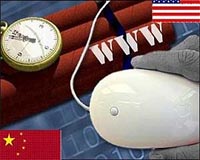| . |  |
. |
Beijing (AFP) Jan 26, 2010 Two months ago US President Barack Obama visited China and pledged with his counterpart Hu Jintao to apply a concerted political might to solve the world's toughest problems. Today, the idea of a "Group of Two" coalition appears to be a mirage after clashes on Internet freedom, climate change, trade issues, the yuan's value, US arms sales to Taiwan and a visit to the US by the exiled Dalai Lama. Google's threat to leave China has exposed fault lines in ties between Beijing and Washington, and the row could signal the start of a difficult phase in their relationship, analysts say. "We're headed down a path marked hardline, and statesmanship will be required to turn us away from it," said Beijing-based political analyst Russell Leigh Moses. The US Internet giant's complaint over cyberattacks and censorship has quickly escalated into a major diplomatic row, adding to the list of thorny issues already separating the United States and China. And the latest spat follows recriminations stemming from December's Copenhagen climate conference in which China was accused of deal-spoiling tactics and sending comparatively junior delegates to meet with Obama. Google this month said it could ditch its Chinese search engine, and perhaps leave China altogether, over hack attacks which it said originated in the Asian giant. It also says it will no longer bow to Chinese state censors. At first, the shock announcement attracted a muted response from Beijing and Washington, with Chinese officials insisting it would not affect trade ties. But a speech last week by US Secretary of State Hillary Clinton -- in which she urged a thorough probe of the Google attacks and questioned Beijing's curbs on the world's biggest online community -- upped the stakes considerably. Chinese foreign ministry spokesman Ma Zhaoxu said Clinton's speech had been "harmful" to bilateral relations, and Beijing later angrily denied involvement in the Google attacks -- indicating a significant change in tone, experts say. "The closer that Clinton gets to Google, the more it seems to many people in the Chinese government that this is a conspiracy, a concerted turn in strategy towards Beijing," said Moses. "Most Chinese officials understand the downside to a downturn in Sino-American relations but a number of them are willing to pay that price because they don't want to be seen as being weak." Jean-Pierre Cabestan, a professor of political science at Hong Kong Baptist University, described the Google row as a "potentially explosive issue" for the Sino-US relationship, as Washington had questioned Beijing on sensitive issues. "It relates to issues of foreign and domestic policy, in a way that might be even more sensitive than the traditional issue of human rights, because it touches on the control of information and society by the government in power," Cabestan said. Sarah McDowall, a political analyst for research group IHS Global Insight, agreed, saying Clinton's speech had backed China into a corner. "Overall, the Chinese government cannot avoid politicisation of the issue -- it has to stick by domestic Chinese legislation governing censorship for reasons of political stability," she said. The US leader has said he is "troubled" by the attacks on Google, according to the White House; China's state media responded by accusing Washington of "double standards" on issues of Internet freedom. Analysts also suggested that Obama -- perceived in some domestic circles as soft on China -- could be adopting a tough line on the Google issue to curry favour with US voters ahead of this year's crucial mid-term elections. "He may take advantage of the Google situation to adjust his strategy towards China," said Hu Xingdou, a professor at the Beijing Institute of Technology. China and Google could still work things out, but that possibility was becoming more and more remote as the row continued to simmer, analysts said. "The sense one gets is... (China's) going to insist Chinese law be enforced and that would mean Google continuing to censor itself," said Paul Harris, head of the social science department at the Hong Kong Institute of Education. "My sense is that Google won't give in, and if that happens, what level of business is Google going to be able to keep in China, and what is going to be the reaction from Washington?" he said. "I think that relations will be going downhill, and rather quickly and steeply."
Share This Article With Planet Earth
Related Links Learn about the Superpowers of the 21st Century at SpaceWar.com Learn about nuclear weapons doctrine and defense at SpaceWar.com
 Walker's World: Ganging up on China
Walker's World: Ganging up on ChinaWashington (UPI) Jan 25, 2009 The row over Internet censorship between Google and China got all the headlines, but the really alarming development for Beijing in the last week came from India. The unprecedented decision by the Indian government to deliver a formal diplomatic demarche against Chinese trade policies was just one of a range of developments in recent days that must be troubling the Chinese leadership. ... read more |
|
| The content herein, unless otherwise known to be public domain, are Copyright 1995-2009 - SpaceDaily. AFP and UPI Wire Stories are copyright Agence France-Presse and United Press International. ESA Portal Reports are copyright European Space Agency. All NASA sourced material is public domain. Additional copyrights may apply in whole or part to other bona fide parties. Advertising does not imply endorsement,agreement or approval of any opinions, statements or information provided by SpaceDaily on any Web page published or hosted by SpaceDaily. Privacy Statement |